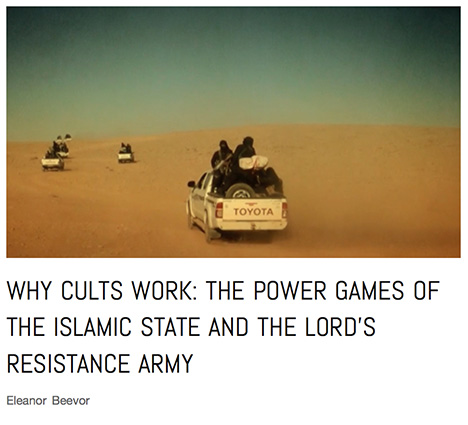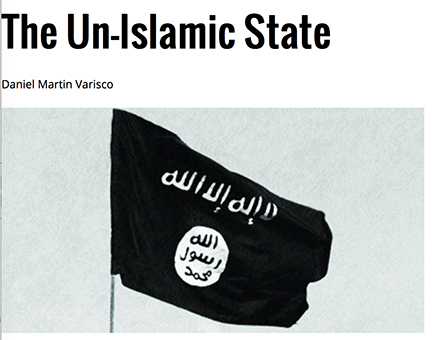
There is an excellent analysis of ISIS as a cult recently posted on War on the Rocks.
Here is the start, but click here for the full article…
Why Cults Work: The Power Games of the Islamic State and the Lord’s Resistance Army
by Eleanor Beevor
Graeme Wood’s article “What does ISIS really want?†has become the most discussed foreign policy article of the year. Yet the piece’s power lies not in the title question, but in Wood’s blunt assessment of a paradox that leaves Western leaders flummoxed: How does one explain the traction of the Islamic State in Iraq and the Levant (ISIL), while also denying its religious legitimacy, in order to combat anti-Muslim bigotry? Wood didn’t mince words in refuting this hesitancy:
The reality is that the Islamic State is Islamic. Very Islamic… the religion preached by its most ardent followers derives from coherent and even learned interpretations of Islam.
What follows is a fascinating piece of research, and a frustrating read. Despite addressing all the right aspects of ISIL’s ideological content to understand its power, Wood’s argument is guided by the wrong question: “How Islamic is ISIL?†For him, denial of ISIL’s Islamic nature is why we fail to understand it. The analytical pitfalls of quantifying “Islamic-ness†should be self-explanatory. Are some of Islam’s 1.6 billion practitioners less Muslim than others if they are less violent? How do we explain the religious devotion of politically “quietest†Salafism, compared to the British ISIL fighters who purchased Islam for Dummies pre-departure? This is not to say that religion is irrelevant in the analysis of ISIL. ISIL uses Islam as an existential anchor, so its actions have to be influenced by it in order to work. It also freely capitalizes on global Islamist sentiment. But to say the whole structure is uniquely, potently Islamic is not just a logical fallacy, but part of the very illusion that sustains loyalty to it. Actually, the features that Wood claims represent ISIL’s Islamic orthodoxy – its obsession with “purity†and the apocalyptic prophecy it stakes its claim on – have “been done,†and not just by Islamists. This is revealed by comparing ISIL with another notoriously violent army, led by another self-styled holy man.
ISIL and the Lord’s Resistance Army (LRA) represent grabs for power, but power of a cosmic kind, beyond what human society can grant them. In examining both, I suggest a word substitution. The ways in which ISIL works, to extraordinary success, are not uniquely Islamic. They are uniquely “cultic.†And to examine ISIL as a cult is to see chinks in its armor. ISIL’s territory may be shrinking, but that alone won’t kill the loyalties of its cadres, nor slow the spread of its bloody sectarian ideology. In ISIL, as in the LRA, knowledge is power. If we can challenge the leaders’ tight hold on that power, ISIL’s ideological grip on its fighters might just begin to crumble…








